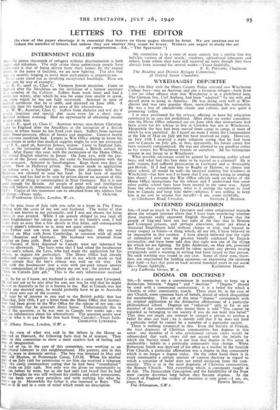DOGMA OR DOCTRINE?
Sfit,—It seems to me a convenience in terminology to keep up a distinction between " dogma " and "doctrine." "Dogma" should be used with a communal connotation: it is a belief for which a Church, or other community, stands. There must be, in the case of any Church, some common basis of beliefs, denial of which disqualifies for membership. This use of the term "dogma" corresponds with its original application to the distinctive affirmations of a particular philosophical school. Dogmas are " enforced " only so far as any member of the community who denies them is told "You cannot be regarded as belonging to our society if you do not hold this belief." This does not imply any attempt to compel a person to profess a belief he does not hold ; he is merely told that if he does not hold a particular belief he cannot be a member of a particular society. There is nothing tyrannical in this. Even the Society of Friends, the least dogmatic of Christian communities, has dogmas in this sense: any member of it who proclaimed certain views would be admonished that such views did not accord with the beliefs for which the Society stood. It is not true that dogma in this sense is unalterable: beliefs in a particular community may change. When Robertson Smith was deprived of his office as a teacher in the Scottish Free Church, a particular affirmation was a dogma in that conununity which is no longer a dogma today. On the other hand there is in every community a certain amount of current doctrine in regard to which a variation of belief does not entail exclusion from the com- munity. This is so in the most dogmatic of Christian communities, the Roman Church. Not everything which is commonly taught is de fide. The Immaculate Conception and the Infallibility of the Pope were current doctrines long before they became dogmas. In the Church of England the variety of doctrines is very great.—I am, sir,
The Athenaeum, S.W.r.






























 Previous page
Previous page